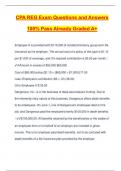CPA REG Exam Questions and Answers
100% Pass Already Graded A+
Employee X is provided with $115,000 of nondiscriminatory group-term life
insurance by his employer. The annual cost of a policy of this type is $1.10
per $1,000 of coverage, and X's required contribution is $3.00 per month. -
✔✔Amount in excess of $50,000 $65,000
Cost of $65,000 policy [$1.10 × ($65,000 ÷ $1,000)] 71.50
Less: Employee's contribution ($3 × 12) (36.00)
GI to Employee X $ 35.50
Dangerous, Inc., is in the business of deep sea treasure hunting. Due to
the inherently risky nature of this business, Dangerous offers death benefits
to its employees. On June 1, one of Dangerous's employees died on the
job, and Dangerous paid the employee's family $100,000 in death benefits.
- ✔✔$100,000.00. All benefits received by the beneficiaries or the estate of
an employee from or on behalf of an employer are included in gross
income. This is for employer-paid death benefits, not to be confused with
death benefits of a life insurance plan provided by the employer.
,Due to the fact that parking downtown is difficult, Lucas Lawyer parks on
the outskirts of the city and uses the subway from there to get to work.
Lucas's employer pays all of Lucas's transportation costs, which are $377
monthly for parking and $465 monthly for the subway. - ✔✔Up to $270 per
month may be excluded for the value of employer-provided transit passes.
Additionally, an exclusion of up to $270 per month is available for
employer-provided parking
Qualified parking [($377 - $270) × 12 months] $1,284
Subway passes [($465 - $270) × 12 months] 2,340
Amount included in income $3,624
Jerry just graduated from college in Florida and accepted a job in
California. This is Jerry's first job. As part of moving to California to accept
this position, Jerry incurred the following costs: $2,000 to ship his furniture;
$600 for gas, tolls, and lodging; $200 for meals en route; and $300 for the
real estate agent that helped him find and lease his apartment. Jerry's
employer reimbursed him for all of these expenses. - ✔✔$3,100.00. As of
tax year 2018, there is no deduction for moving expenses or exclusion for
reimbursed moving expenses.
Two season tickets to football games given to an employee. The tickets
cost $350 each. - ✔✔$700. The value of occasional tickets to
,entertainment/sporting events are a de minimis fringe benefit. However,
season tickets do not qualify as "occasional," and their value must be
included in the employee's AGI
Reimbursement by the employer for $500 of moving expenses incurred by
an employee. - ✔✔$500. As of tax year 2018, there is no deduction for
moving expenses or exclusion for reimbursed moving expenses.
An employee gets a 15% discount on qualified property at the retail store
where he works. The store's gross profit percentage is 18%, and the
discount resulted in $225 of savings. - ✔✔$0. Employee discounts on the
selling price of qualified property and services can be excluded from AGI.
However, the discount may not exceed the gross profit percentage or 20%
of the price offered to customers, in the case of qualified services.
Post Co. has only one employee, and that employee's compensation and
related employment taxes (e.g., FICA, FUTA) are Post's only expenses.
For the year, Post earned $300,000 in revenue and paid $140,000 as
compensation - ✔✔$149,013. Cash paid to an employee is deductible by
the employer. Additionally, the employer may deduct the cost of FICA and
FUTA taxes paid. The employer must pay 6.20% of the first $137,700 of
wages paid for Social Security tax plus 1.45% of all wages for Medicare
tax. FUTA tax is 6.00% of the first $7,000 of wages paid to each employee.
, Thus, Post has deductible FICA tax expense of $10,567 [($137,700 ×
6.20%) + ($140,000 × 1.45%)] and deductible FUTA tax expense of $420
($7,000 × 6.00%). Therefore, Post has gross profit of $149,013 ($300,000
revenue - $140,000 compensation - $10,567 FICA taxes - $420 FUTA
taxes).
French Treats, a small bakery, had $52,300 of start-up expenses and
earned $7,000 of revenue during December (the month that business
began - ✔✔$4,024. Taxpayers can deduct up to $5,000 of start-up costs in
the taxable year in which the business began. Any start-up costs in excess
of $5,000 are capitalized and amortized over a 180-month period beginning
in the month in which the active trade or business begins. The amount of
this deduction is reduced (but not below zero) by the amount of start-up
costs that exceed $50,000. French Treats is allowed a startup deduction of
$2,700 [$5,000 - ($52,300 - $50,000)] and an amortization deduction of
$276 [($52,300 - $2,700) ÷ 180 months] for December. Therefore, French
Treats has net profit of $4,024 ($7,000 - $2,700 - $276).
If COGS = Beginning inventory + Purchases - Ending inventory, then
Purchases = COGS - Beginning inventory + Ending inventory -
✔✔Purchases = COGS - Beginning inventory + Ending inventory,




